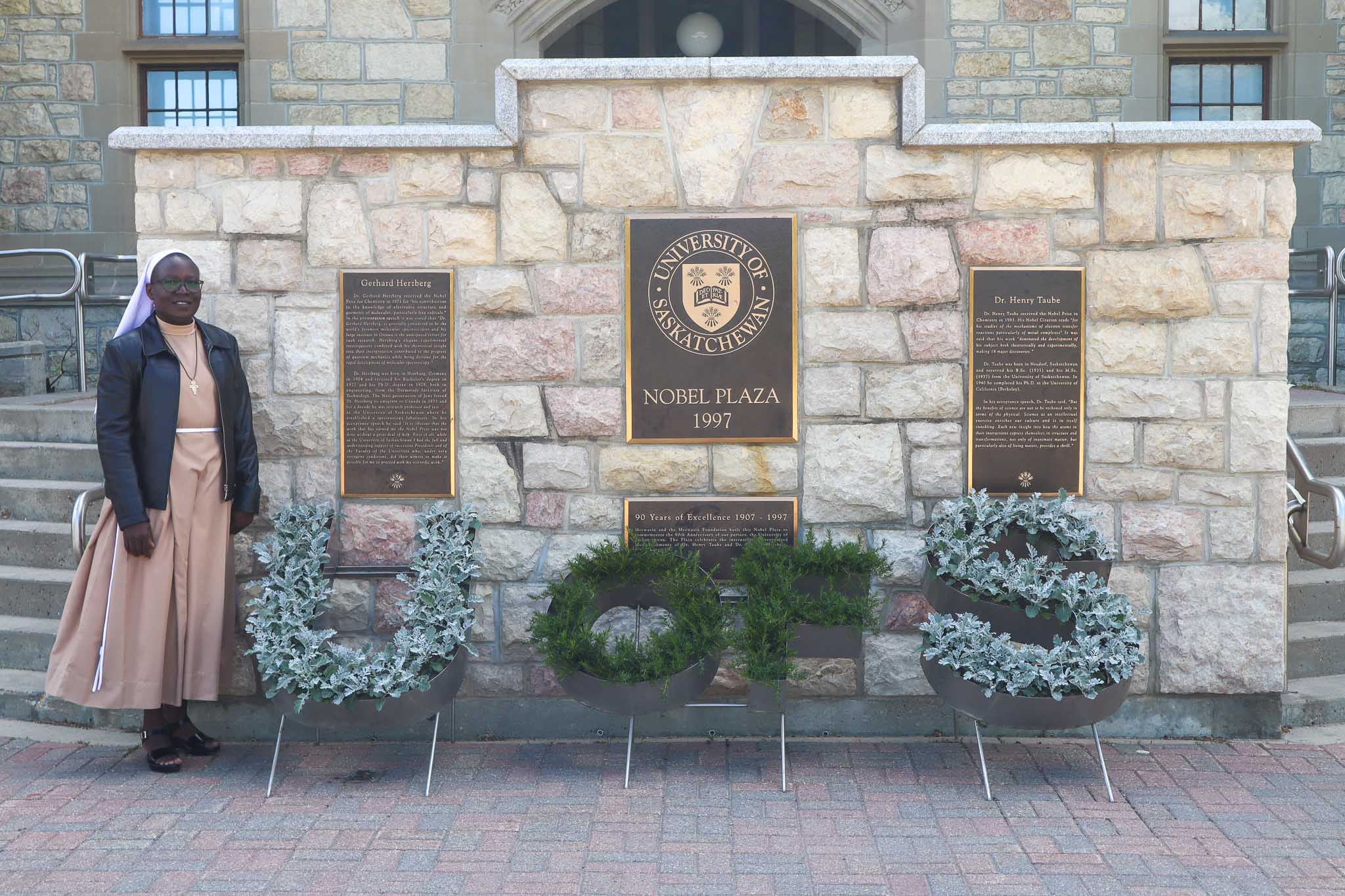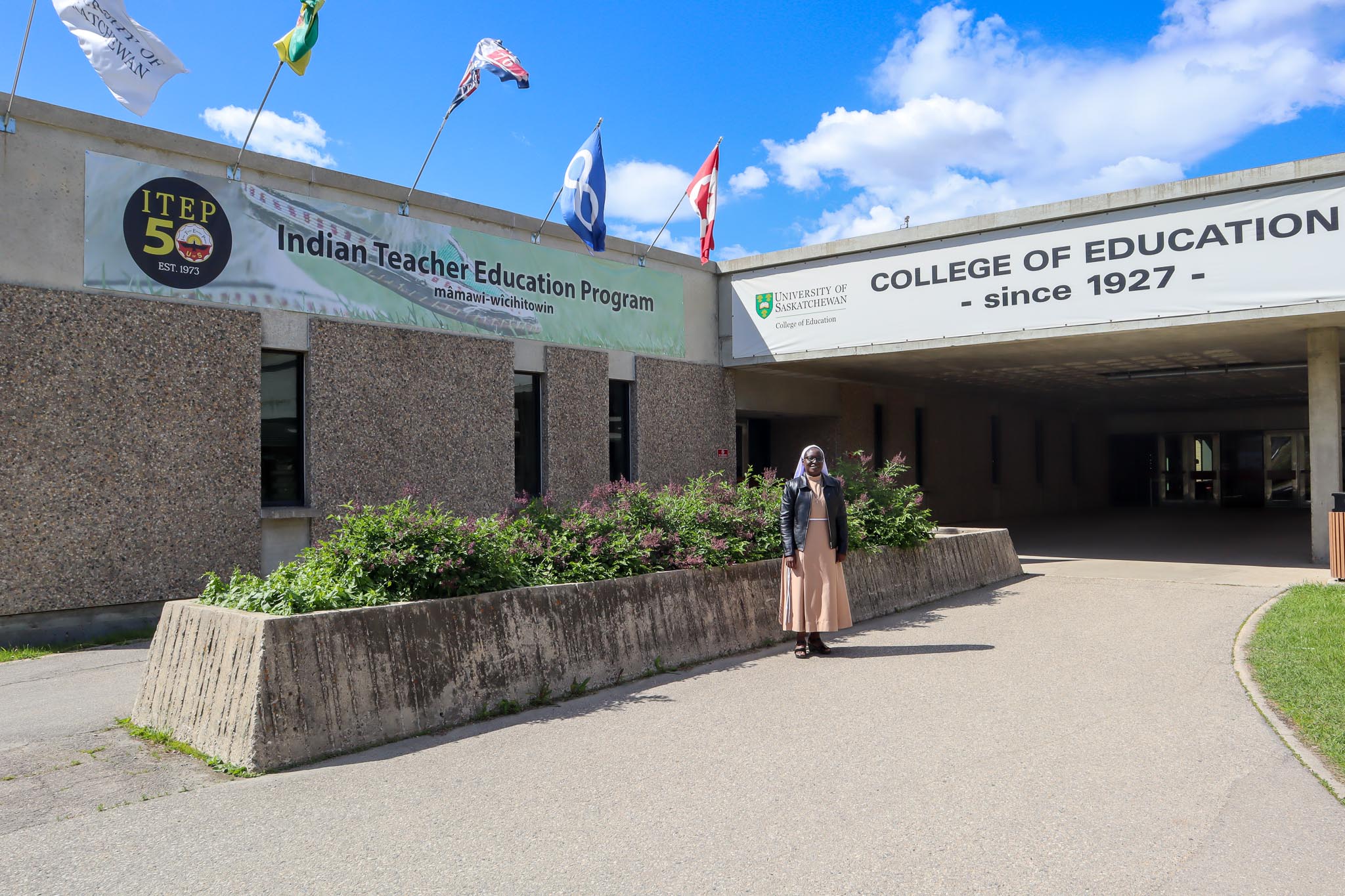
Researching Kenyan and Canadian Context of Parental Engagement in Learning
Sr. Lilian Akinyi Oyula, FSJ, a visiting scholar from Kenya, has been granted a six-month Study in Canada Scholarship by Global Affairs Canada and the Canadian Bureau for International Education (CBIE). Oyula, who is pursuing a Doctor of Philosophy (PhD) in Educational Management at Kenyatta University (KU), Kenya, is conducting research at the University of Saskatchewan (USask).
By Connor JayUnder the supervision of Professor Dr. Janet Okoko from USask's College of Education, along with her advisors at Kenyatta University, Oyula is in her fourth year of study. Her dissertation focuses on School Leaders' Management Practices and their Influence on Parental Engagement in Teaching and Learning in Primary Schools in Migori County, Kenya.
Oyula's interest in this field was sparked during her decade-long career as a high school teacher, where she observed the need for a more collaborative and inclusive approach between parents and school leaders. Her goal is to develop a platform that encourages active parental participation and fosters the holistic development of learners capable of meeting the challenges of the 21st century.
Oyula’s research aims to create a meaningful impact on educational management practices in Kenya, enhancing the collaboration between parents and educators to support students' holistic development and achievement.
Describe your research background. Did you know your supervisor, Dr. Janet Okoko (PhD), before you started applying for visiting scholarships?
I didn't know her beforehand. When I chose this topic for my doctoral dissertation, I was passionate about creating practical partnerships between school leaders and parents. When she sent a call for papers with a similar focus to our department at KU, I was interested and did my application. The process was very competitive, but my concept paper was highly rated and met Professor Dr. Okoko’s expectations. That is how I got the opportunity to fly to Canada.
I would love to share my background in research from the Kenyan perspective.
To begin with, there is a change in curriculum to realize parental engagement. The previous curriculum, which was the 8-4-4 system (eight years of primary education, four years of secondary education, and four years of university education), had gaps when it came to engaging the parents in the process of teaching and learning. Kenya has a new curriculum, the competency-based curriculum (CBC) that has been established to meet the needs of the 21st century and also to meet the vision 2030. CBC is more involving and engaging and is anchored on collaboration, communication, active participation in decision-making and creating partnerships. The Ministry of Education came up with a guideline on parental empowerment and engagement. I am studying the guidelines and strategizing ways of implementing them so that parents are fully engaged because the benefits of engagement are huge to the learners and parents.
A lot of research and studies have been done on the issue of parental engagement, but there are still gaps in this aspect of parental engagement and, most importantly, how school leaders are prepared for this engagement.
When parents engage, the learners improve their academic achievement, learners become more disciplined and respectful, complete assignments on time, regularly attend school and, above all, gain life-long skills and values that enable them to contribute positively to society. I found this aspect of parental engagement to be very significant.
What sparked your interest in parental engagement?
My interest in parental engagement developed when I looked at the trends surrounding dropout rates, issues revolving around poor academic achievement and indiscipline which are very rampant in some schools in Kenya. I asked myself, "If parents are fully engaged from home and even at school, and make follow-ups on the children, then these issues of dropouts and absenteeism in schools, low achievement, and indiscipline may not rise."

Why did you choose USask?
The invitation was part of a memorandum of understanding between the University of Saskatchewan and Kenyatta University. I found it as an opportunity that I would explore and have new experiences, have some experiential learning, collaborate with students and faculty and network. After learning more about the University of Saskatchewan from the website, I appreciated the aspect of inclusivity and the virtual programs they had for welcoming newcomers.
I was amazed because I didn't feel like I was going to a foreign place. The website made it feel like I was already there and at home. Another reason I wanted to come was to build on my scholarly interactions and gain opportunities to mobilize knowledge about the dissertation.
You arrived in January and the middle of winter. How was adjusting to your first experience in Canada?
That was something huge, winter was a huge cultural shock since I had never seen, touched, or felt snow before. I am old enough, but I didn't have the experience of snow and I didn't have experience of very low temperatures like -20° and -30° since East Africa has relatively stable temperatures over the year.
But I must say that I got good a reception, and very hospitable people, that were able to come my way at the International Student [and Study Abroad] Center (ISSAC). They prepared me to manage the cold by offering me winter jackets because the jackets I bought in Kenya hoping would manage this temperature actually would not.
Professor Janet, Lecia [Ellis], the International Student Center, and Megan [Fillatre] helped to support me.
I remember asking [Graduate Programs and Internationalization Specialist] Megan Fillatre to stop the car so that I could feel the snow with my fingers…
How are you going to implement your research back home in Kenya?
When I get back to Kenya, I hope that this research impacts the education system in a way that the scholarly paper that I am writing will be able to advance school leaders’ knowledge on how to be able to engage effectively with parents. I hope that this study will inform decision-making when it comes to parental engagement. I hope to work with school leaders, the Ministry of Education, scholars of like minds and beyond, and the parents to realize these.
After my dissertation, I hope to share the outcomes of the research so that school leaders can learn some management practices that parents would feel comfortable with for improved engagement in student learning.
What are some highlights from your time at USask?
I have enjoyed my stay in USask. I didn't know how to pronounce Saskatchewan before I got here but now I am good at it. The faculty of Educational Administration have been very friendly and instrumental in supporting my research.
I appreciate the department's organization and planning, especially, the commitment of the staff and faculty during departmental and college events and activities.
As a result of proper mentorship by Prof. Okoko, I have a broad and more comprehensive worldview in terms of theory and methods for my dissertation, a deeper understanding of ethical consideration and the approval process, opportunities to mobilize knowledge about the dissertation, and developing a qualitative study. I welcome Scholars willing to collaborate with me in my scholarly work to reach out to me for an impactful realization of my research journey.
For inquiries, Sr. Lilian Akinyi Oyula can be contacted via email.
Note: This interview was condensed and edited for clarity.
Together we will support and inspire students to succeed. We invite you to join by supporting current and future students' needs at USask.

